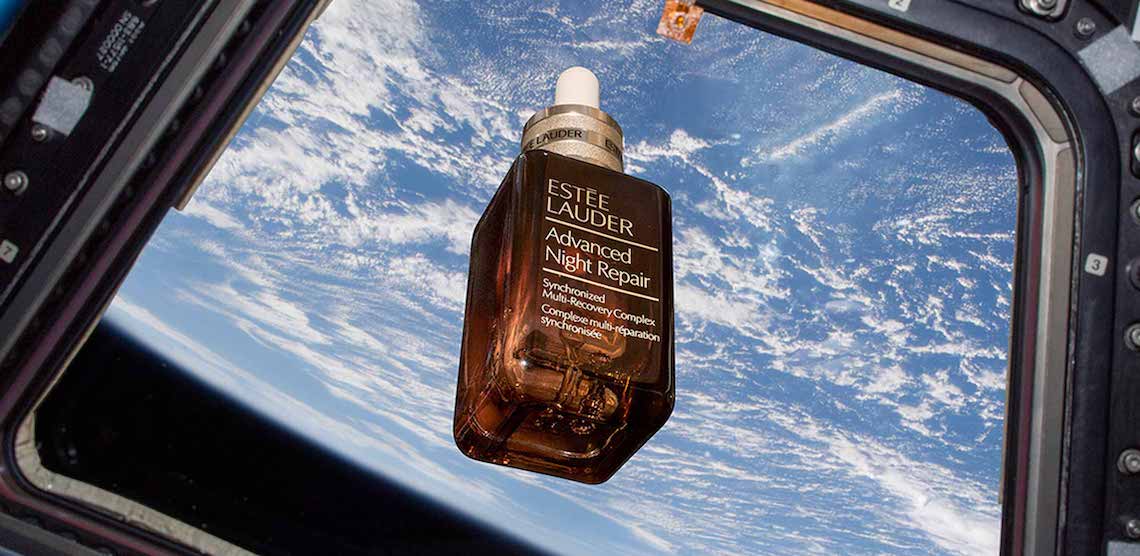To tackle the beauty industry’s plastic waste problem, Estée Lauder is looking for solutions in outer space.
More specifically, Estée Lauder announced on Thursday a partnership with the International Space Station National Lab to fund sustainability research projects that utilize the ISS for independent researchers’ experiments. Estée Lauder intends to provide up to $1 million in funding. Estée Lauder previously worked with NASA on a commercial project to photograph its products in space, but has not worked with the ISS National Lab before. A recent Department of Energy roadmap stated that 80% of plastic waste ends up in landfills or elsewhere in the environment, and only 14% of plastic packaging is collected for recycling.
“This ISS National Lab Sustainability Challenge partnership allows us to accelerate our sustainability agenda further and stay at the very forefront of innovation,” said Stéphane de La Faverie, Estée Lauder global brand president, in a statement to Glossy. “We hope that the research will ultimately lead to the development of broad-use biopolymers or plastics alternatives that can translate to many industries, including the beauty industry.”
The initial three-step application process for prospective researchers starts with submitting a concept for review by Dec. 6. The sustainability research application asks researchers to focus on three areas of research: reducing plastic waste introduction into the environment, seeking alternative feedstocks and pathways for polymer production beyond petrochemicals, and reducing virgin plastic manufacturing. As a second step, invited applicants are then requested to submit a presentation and pre-recorded “pitch video.” After further selection, a question-and-answer between 10 invited finalists and expert judges will rank all finalists.
On March 19, 2022, the 10 finalists will be invited to the Kennedy Space Center Visitor Complex in Cape Canaveral, Fl. for a one-day session. There, their presentations will be showcased and live-streamed to a global audience. The event will also include a ceremony to recognize the top-three-ranked finalists. Following the event, all finalists are invited to submit a full proposal for a flight project leveraging the ISS National Lab. The final project or projects will be selected in July of 2022.

“We’re hoping that this brings the public some awareness about the International Space Station and what we’re doing [with sustainability],” said Christine Kretz, ISS National Lab vp of programs and partnerships. “Like a hackathon — where people can get together and chew on an idea together and compete — is what we wanted to do here, both in sharing insights with other researchers and having a bit of competition.”
Ad position: web_incontent_pos1
Estée Lauder’s partnership with ISS National Lab is a marriage of two main trends within the beauty industry. The first is collaboration, as more brands have come together to share information surrounding sustainable solutions. Notably, Estée Lauder will not own the outcoming intellectual property from the research, which will remain with researchers and universities. Secondly, the beauty industry is asking for more federal oversight over sustainability, as seen with the recent Code Red 4 Climate initiative. Estée Lauder’s is demonstrative of how collaboration with a federal public agency can yield innovative sustainability approaches.
Dr. Ryan Reeves, Ph.D., ISS National Lab materials scientist, explained that the ISS’s unique microgravity environment is helpful in studying microorganisms and the way they change in space, which may lead to new pathways for improved biopolymer production, which form bioplastics. Another possible learning is the impact of microgravity on crystal formation and growth; studying crystal formation in microgravity can also help with finding alternative options for petroleum-based plastics. These are two potential avenues that could accelerate the research and development of plastic alternatives.
On its side, Estée Lauder intends to announce the sustainability research program on its social media platforms, which includes Facebook, Instagram and, most recently, TikTok. It will also share the information and across the brand’s e-commerce website and via a dedicated email to its customers.
“Estee Lauder is funding this [project], not because it serves them specifically, but because they see it as valuable for the planet,” said Kretz. “If we can find better ways to package items and save them from going into a dumpster, that’s terrific.”




